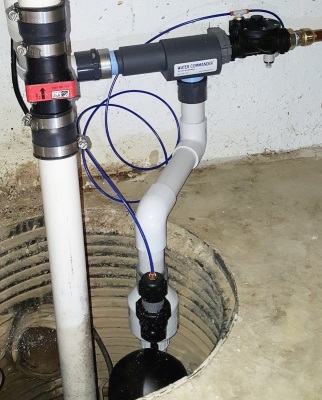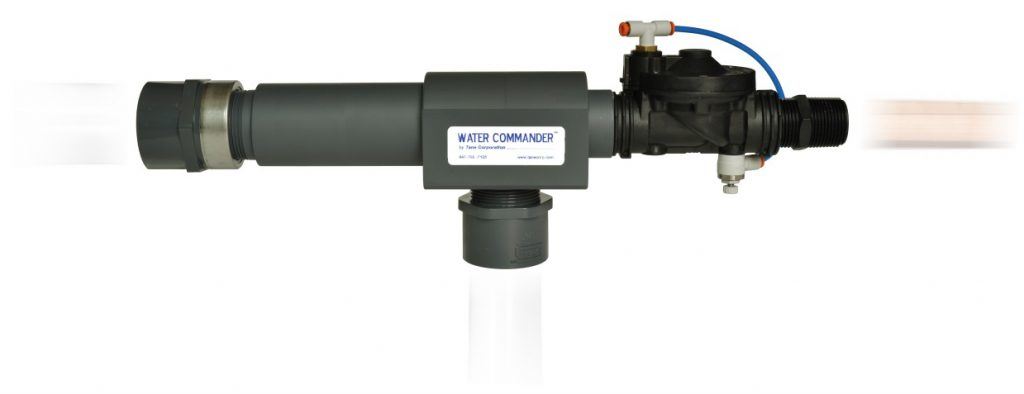Learn the key differences between battery backups and water-powered backup sump pumps.
If you are a homeowner looking to purchase a backup sump pump in addition to your primary electric pump, you have two options—a battery backup or a water-powered backup sump pump.

The most common is battery backups, which require purchasing both the pump itself and also a battery separately. However, water-powered backups have been steadily growing in popularity as homeowners become aware of their advantages. Water-powered backup sump pumps run using your home’s municipal water pressure—no batteries or electricity are needed at all.
Both types of backup sump pumps are designed to protect your basement from flooding in the case of a power failure or a mechanical failure that would prevent your primary sump pump from operating.
The question is, which does a better job and why?
We’ll take a look at 4 main criteria to compare both pumps:
- Run Time: How long can the backup pump continuously run?
- Life Span: What is the total life of the pump before you have to replace it?
- Pumping Rates: How fast does it pump?
- Cost: What is the cost of the pump over its entire life?
If you’re curious, we have a comparison chart at the bottom summarizing each criteria for both battery and water-powered backups. Let’s get into it.
1. Pump Run Time
Once you’ve installed a battery backup with a brand-new battery, you will get about 7 to 8 hours of run time. As any battery ages, its charge capacity reduces. So, while a new battery may give you 8 hours of run time, a three-year-old battery may have only 2 or 3 hours of run time. That is a critical difference. After 5 years you will see even less run time.
It is very common for homeowners that think they are protected with a battery backup to experience a flood due to an older battery. If the power outage outlasts the battery charge, you will effectively have no pump and your basement can quickly flood.
However, water-powered pumps will run for an unlimited amount of time. This is one of the primary benefits of these pumps. Since they do not need a battery, there is no need to worry about battery replacement or run-time limits.
2. Life Span
Batteries designed for backup sump pumps will last a limited amount of time. The largest manufacturer of battery backups recommends that you replace the battery with a new one every three years. In addition to the required battery replacement, battery backup sump pumps can mechanically fail after prolonged use.
The highest quality water-powered sump pump available, Water Commander™, can last up to 20+ years. You don’t need to replace any parts, just test it twice a year by lifting the float or unplugging your electric pump.
3. Pumping Rates
The actual pumps provided with emergency battery backups typically are either 1/4 HP or 1/3 HP. Depending on how powerful the pump is, most backups are rated to pump between 800 and 2,000 GPH, but that is only with a brand new, fully-charged battery.
In actuality, emergency backups experience significantly diminished pumping rates as they age. Just as the battery’s capacity to hold a charge reduces over time (see run time), so does its ability to pump at full power. After only a year or two you may see your battery backup start to pump at a slower and slower rate as the battery spends its charge and grows weaker. The same phenomenon can be seen on a flashlight. When the battery is new the light is bright—but over time the light gets dimmer and dimmer when you turn it on—until it doesn’t work at all.
Not only that, but if you lose power and the backup is running, its pumping rate will continually reduce the longer the pump runs. In our article “How Long Does a Backup Sump Pump Battery Last?“, we cite a North Dakota State University study that found the batteries used by backup pumps last between 4-7 hours of continuous running.

However, the most powerful water-powered brand, Water Commander™, can meet and exceed the pumping rates of a good electric sump pump (see pumping rate table). Our high-performance model MG22 can pump up to 1,800+ GPH, while our ultra-performance model MG36 can pump up to 2,830+ GPH (both pumps can use ¾” or 1″ water supply). It all depends on the amount of water pressure you have available in your home. The higher the pressure, the more powerful the water-powered pump. So it’s a good idea to call your local water company and ask what the water pressure is for your neighborhood. You can also check with a simple pressure gauge available at the local hardware store.
Additionally, unlike battery backups, water-powered pumps maintain the same pumping rates over time. Since your home’s municipal water pressure is the source of its energy, the pumping capacity remains consistent no matter how long ago it was installed.
4. Total Sump Pump Cost
Battery backup sump pumps are available in most home centers. A backup pump kit can run from $200 to $900 typically depending on the pumping power. In addition to the backup pump kit, you’ll have to buy the battery separate. They typically are designed to utilize one battery, similar to a car battery. Typical battery cost runs from $150 to $250, depending on the quality of the battery. In addition to these upfront costs, you will have to replace the battery every 2-3 years, which significantly increases the total cost over its lifespan.
Water-powered backup sump pumps cost levels vary depending on the style and quality. The low-cost models have lower pumping capacities and a shorter life than the professional models, but can serve you well if there is not too much water coming into your sump. But even the best water-powered pump, Water Commander™, is still less expensive than a lower end battery backup with battery.
Summary
When you compare battery backups with water-powered backups, it’s clear that the water-powered design is the ideal backup solution for homeowners who have municipal water supply. Not only do water-powered sump pumps have unlimited run time and can last for many more years, the best brand (Water Commander™) can out-pump battery backups and even your standard electric pump.
Head-to-head Comparison
| Battery Backups | Water Commander™ | |
|---|---|---|
| Run Time | 7-8 hours with new battery, reduces over time and with each use | Unlimited |
| Life Span | Replace after 3 years | Up to 20+ years |
| Pumping Rates | Less than electric pump and loses pumping power over time | Can meet or exceed electric pumping rates |
| Cost | Must buy pump, separate battery, and replacement batteries every several years. | One-time purchase. Less than total cost of battery backups. |
Want to learn more?
If you would like to learn more about water-powered sump pumps, visit our main website. You can learn more why Water Commander™ beats battery backups and is the best water-powered backup available on the market.
Contact us if you have any questions and we’ll help you out.
Looking for a quality backup sump pump?
Water Commander™ is the best backup sump pump system available on the market today. It’s non-electric, can out-pump your electric sump pump, and will run at full power for years to come.
It is more reliable than battery backups and is the perfect solution for homes with municipal water.
Top Posts
- Water-Powered vs Battery Backup Sump Pumps
- How Long Does a Backup Sump Pump Battery Last?
- How Do Water-Powered Sump Pumps Work?
- How Much Water Does a Water-Powered Sump Pump Use?
- Why Independent Discharge for Your Backup Sump Pump Is Best
Recent Posts
- How To Measure Your Home’s Water Pressure
- Why Is My Sump Pump Not Working?
- How to Prevent Basement Flooding
- Battery Backup Sump Pump Troubleshooting Guide
- My Battery Backup Sump Pump Alarm Won’t Stop Beeping (Fixes)
Categories
Tag Cloud
Alarm Backup Sump Pump Batteries Basement Flooding Beeping Bernoulli Principle Best Sump Pump Check Valves Crawlspace Discharge Pipes Drain Tiles Ejector Jet Float Assembly Independent Discharge Municipal Water Perforated Sump Pits Power Outages Primary Sump Pump Failure Pros and Cons Pumping Charts Pumping Efficiency Pumping Rates Pump Life Span Pump Run Time Pump Testing Radon Gas Suction Pipe Sump Basin Sump Pump Motor Sump Pump Switch Troubleshooting Ultimate Guide Venturi Effect Water Drainage Systems Water Pressure Water Pressure Gauge Water Usage